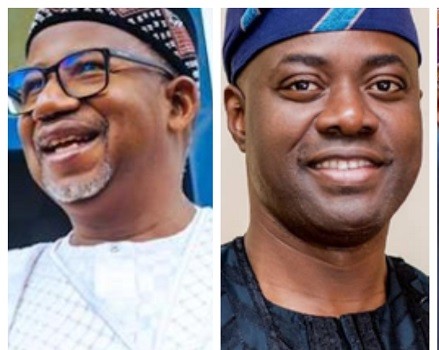The leadership crisis in the Peoples Democratic Party (PDP) took a dramatic turn on Tuesday as a faction loyal to the Minister of the Federal Capital Territory (FCT), Nyesom Wike, announced the expulsion of three serving governors and several top party leaders. The decision came shortly after violent clashes rocked the party’s national headquarters, Wadata Plaza, Abuja, deepening internal divisions and raising questions about the party’s unity ahead of future elections.
Those expelled include Oyo State Governor Seyi Makinde, Bauchi State Governor Bala Mohammed, and Zamfara State Governor Dauda Lawal. Others removed from the party include former Chairman of the Board of Trustees (BoT), Senator Adolphus Wabara; former Minister, Senator Kabiru Tanimu Turaki; and Deputy National Chairman (South), Taofeek Arapaja. The faction said the expulsions were due to “anti-party activities” and actions that allegedly brought the party into disrepute.
The announcement came after the factional National Executive Committee (NEC) held its 103rd meeting in Abuja. The acting National Chairman of the faction, Mohammed Abdulrahman, presented the memo recommending the expulsions, while the NEC communique was read by the National Secretary, Senator Samuel Anyanwu.
The PDP, once Nigeria’s largest political party and the ruling party for 16 years, has been struggling with internal disputes since it lost power at the federal level in 2015. The crisis worsened after the 2023 general elections, as competing blocs within the party fought for control of its leadership structures.
Tuesday’s expulsions followed a violent clash earlier in the day between the Wike-backed faction and the faction loyal to Kabiru Tanimu Turaki, who was recently elected National Chairman by a rival group within the party. Both factions claimed legitimacy and attempted to hold separate meetings at the same venue, leading to chaos and a heavy security presence at the PDP headquarters.
The confrontation reportedly escalated to the point where police fired tear gas. Bauchi State Governor, Bala Mohammed, and Oyo State Governor, Seyi Makinde, said they were tear-gassed during the incident as they tried to calm tensions. The police have not released a statement to confirm this claim.
In addition to the expulsions, the Wike-backed NEC also ratified the dissolution of the PDP State Executive Councils in seven states—Bauchi, Oyo, Zamfara, Yobe, Lagos, Edo, and Ekiti. These states are believed to be aligned with the rival faction, and their dissolution is seen as an attempt to weaken opposition within the party.
According to the NEC communique, the expulsions were triggered by the affected members’ “disregard for court judgments” and participation in an “unauthorized convention.” The Wike-backed faction accused them of violating Articles 58(1) and 59(1) of the PDP constitution, which address party discipline and conduct.
The communique stated:
“The National Executive Committee (NEC) met on 18 November 2025 to address recent developments affecting the unity, stability, and constitutional order of our party. At a time when Nigerians look to the PDP for leadership, NEC convened to uphold truth, justice, discipline, and respect for the rule of law.”
“NEC expressed deep concern over the actions of some members who violated subsisting court orders by organizing and attending a purported and unauthorized convention. This act triggered confusion, factionalisation, and the defection of governors and legislators nationwide.”
Furthermore, NEC insisted that the party’s legitimacy comes from “strict adherence to its Constitution and that of the Federal Republic of Nigeria, not from impunity.”
Nyesom Wike has remained a powerful figure in the PDP even after joining the federal cabinet of the ruling All Progressives Congress (APC) as FCT Minister in 2023. His participation in the APC-led government has caused divisions within the PDP, with many members accusing him of working against the party’s interests.
Wike’s rise within the party intensified after the 2023 presidential election when he led the “G5 Governors,” a group of five PDP governors who refused to support the party’s presidential candidate. Since then, the struggle for control between his loyalists and other factions has dominated the PDP’s internal politics.
The emergence of rival NECs, conflicting court rulings, and prolonged disputes over leadership positions have left the party fractured. Tuesday’s events show the conflict is far from over.
The Turaki-led faction is expected to reject Tuesday’s expulsions, insisting that Mohammed Abdulrahman and Senator Anyanwu lack the authority to act on behalf of the party. According to them, Turaki is the legitimate National Chairman elected through a valid process, and any NEC meeting not convened by him is illegal.
The governors who were expelled still command strong influence in their states and may challenge the decision in court. Their removal could provoke a deeper crisis within the party at the national and state levels.
The PDP’s ongoing crisis raises concerns about its ability to function as an effective opposition party. With Nigeria facing significant economic, security, and governance challenges, many citizens expect strong political leadership. But the PDP’s internal battles continue to distract it from playing this role.
Despite the harsh tone of Tuesday’s decisions, many members and stakeholders have called for dialogue and reconciliation. Some believe that only a unified national convention, recognized by all factions, can settle the leadership dispute.
For now, the party remains divided, and the struggle for control is likely to continue. The events at Wadata Plaza show that the PDP is at a crossroads, and what happens next could shape its relevance in Nigeria’s political landscape.

